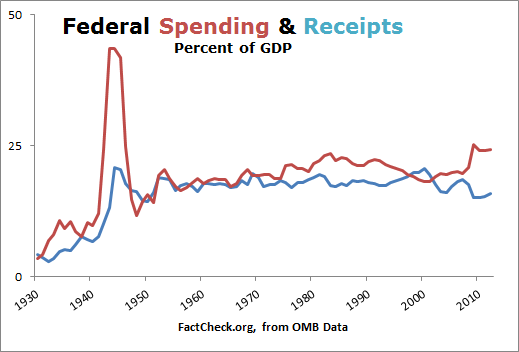I am still trying to figure out the Republican argument that the way to create jobs is to shut down government. That means putting government employees out of work -- that is, adding to the pool of unemployed, right? It also means allowing the great corporations the freedom to swallow up their smaller and weaker competition; also, to have a powerful influence on public knowledge through television advertising. How can "jobs" somehow spring from a policy that seems on the face of it to put people out of work and to favor the fat cats who already have plenty of money and jobs?
Factcheck has a chart of the relation between Federal spending and Receipts going back to 1930. This is useful in looking at the relation between these two conditions in the national economy and what we know about the impact of various policies on the American economy. What stands out is how heavily the United States overspent during World War II, but also that despite that heavy expenditure the economy boomed in the next several years, that is, in the 1950s. By the current arguments promoted these days, especially by the Republican Party, the US economy should have gone into free fall after WWII. What we know, of course, is that the building after the war, financed by borrowed money, boosted the economy so that revenues rose sufficiently to pay off the debt.
Another feature of this chart worth noting is that the one time the United States had a surplus -- note, a surplus -- was toward the end of the Clinton era. Clinton should be justly proud of that achievement. But also note that as soon as George W Bush administration came into office they gave it away: they cut revenues and let the debts rise. In fact, if I understand Paul Krugman, that would have been the time actually to have paid down the debt so that the government would have been in a better position to weather any forthcoming storm; to give it away, especially to the well-to-do who scarcely needed it at the time, would seem like squandering an opportunity. The point is, when the economy is in the doldrums spend to get it going again, then cut back when it is doing well.
What Krugman said tonight on the Newshour seems to be true: As long as the Republicans had their man in office they didn't worry about overspending; it is merely now that the other party is in office that they have trumpeted the dangerous levels of debt. If Romney wins then the party who squandered the last opportunity would be back in power -- I would hope not to do it again [!].
For what it's worth, I post the chart here for the interest of anyone trying to figure out how they plan to fix the economy.

No comments:
Post a Comment